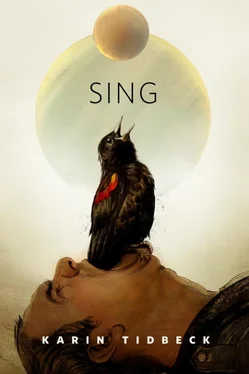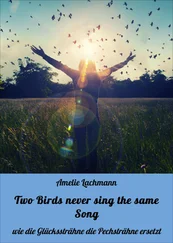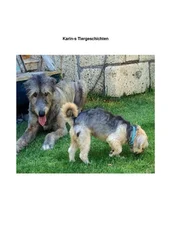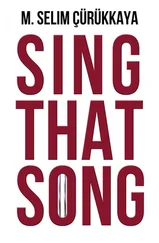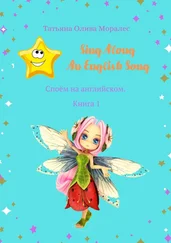“Are you all right with this?” he asked when I didn’t reply immediately.
“It’s good,” I said eventually. “It’s good for you that they like you.”
“I don’t know about ‘like.’ Some of them treat me as if I’m handicapped. I don’t care much, though. I can live with that as long as some of you like me.” His gaze rested on me like a heavy hand.
“Good for you,” I repeated.
He leaned over the counter. “So … maybe you could teach me to sing? For real?”
“No.”
“Why? I don’t understand why.”
“Because I can’t teach you. You are handicapped. Like me.”
“Aino.” His voice was low. “Did you ever consider that maybe they don’t hate you?”
I looked up. “They don’t hate me. They’re afraid of me. It’s different.”
“Are you really sure? Maybe if you talked to them…”
“… they would avoid me. It is what it is.”
“You can’t just sit in here and be bitter.”
“I’m not,” I said. “It just is what it is. I can choose to be miserable about it, or I can choose not to be.”
“Fine.” He sighed. “Does it matter to you if I stay or leave?”
“Yes,” I whispered to the shirt in my lap.
“Well, which is it? Do you want me to stay?”
He had asked directly, so I had to give him an answer, at least some sort of reply. “You could stay a while. Or I could go with you.”
“I told you. I’m not going back to Amitié.”
“All right,” I said.
“Really?”
“No.”
* * *
I could have kept quiet when the procession went by. Maybe then things would have been different. I think he would have found out, anyway.
We were down by the river. We pretended the last conversation hadn’t happened. He had insisted on helping me with washing cloth. I wouldn’t let him, so he sat alongside me, making conversation while I dipped the lengths of cloth in the river and slapped them on the big flat stone. Maderakka’s huge approaching shadow hovered on the horizon. It would be Petr’s first time, and he was fascinated. The birds were beginning to amass in the air above the plateau, sharp trills echoing through the valley.
“How long will it last?”
“Just overnight,” I said. “It only rises a little bit before it sets again.”
“I wonder what it’s like on the other side,” he said. “Having that in the sky all the time.”
“Very quiet, I suppose.”
“Does anyone live there?”
I shrugged. “A few. Not as many as here.”
He grunted and said no more. I sank into the rhythm of my work, listening to the rush of water and wet cloth on stone, the clatter and bleat of goats on the shore.
Petr touched my arm, sending a shock up my shoulder. I pretended it was a twitch.
“Aino. What’s that?” He pointed up the slope.
The women and men walking by were dressed all in white, led by an old woman with a bundle in her arms. They were heading for the valley’s innermost point, where the river emerged from underground and a faint trail switchbacked up the wall.
I turned back to my laundry. “They’re going to the plateau.”
“I can see that. What are they going to do once they get there?”
The question was too direct to avoid. I had to answer somehow. “We don’t talk about that,” I said finally.
“Come on,” Petr said. “If I’m going to live here, I should be allowed to know.”
“I don’t know if that’s my decision to make,” I replied.
He settled on the stone again, but he was tense now, and kept casting glances at the procession on their way up the mountainside. He helped me carry the clothes back through the workshop and into the backyard, and then left without helping me hang them. I knew where he was going. You could say I let it happen—but I don’t think I could have stopped him either. It was a kind of relief. I hung the cloth, listening to the comforting whisper of wet fabric, until Maderakka rose and silence cupped its hands over my ears.
* * *
I don’t remember being carried to the plateau in my mother’s arms. I only know that she did. Looking down at Petr in my lap, I’m glad I don’t remember. Of course everyone knows what happens. We’re just better off forgetting what it was like.
* * *
Maderakka set in the early hours of the morning, and I woke to the noise of someone hammering on the door. It was Petr, of course, and his nose and lips were puffy. I let him in, and into the back of the workshop to my private room. He sank down on my bed and just sort of crumpled. I put the kettle on and waited.
“I tried to go up there,” he said into his hands. “I wanted to see what it was.”
“And?”
“Jorma stopped me.”
I thought of the gangly doctor trying to hold Petr back, and snorted. “How?”
“He hit me.”
“But you’re”—I gestured toward him, all of him—“huge.”
“So? I don’t know how to fight. And he’s scary. I almost got to the top before he saw me and stopped me. I got this”—he pointed to his nose—“just for going up there. What the hell is going on up there, Aino? There were those bird things, hundreds of them, just circling overhead.”
“Did you see anything else?”
“No.”
“You won’t give up until you find out, will you?”
He shook his head.
“It’s how we do things,” I said. “It’s how we sing.”
“I don’t understand.”
“You said it’s a—what was it?—parasitic ecosystem. Yes?”
He nodded.
“And I said that the hookflies use the goats, and that it’s good for the goats. The hookflies get to lay their eggs, and the goats get something in return.”
He nodded again. I waited for him to connect the facts. His face remained blank.
“The birds,” I said. “When a baby’s born, it’s taken up there the next time Maderakka rises.”
Petr’s shoulders slumped. He looked sick. It gave me some sort of grim satisfaction to go on talking, to get back at him for his idiocy.
I went on: “The birds lay their eggs. Not for long, just for a moment. And they leave something behind. It changes the children’s development … in the throat. It means they can learn to sing.” I gestured at myself. “Sometimes the child dies. Sometimes this happens. That’s why the others avoid me. I didn’t pass the test.”
“You make yourself hosts,” Petr said, faintly. “You do it to your children.”
“They don’t remember. I don’t remember.”
He stood up, swaying a little on his feet, and left.
“You wanted to know!” I called after him.
* * *
A latecomer has alighted on the rock next to me. It’s preening its iridescent wings in the morning light, pulling its plumes between its mandibles one by one. I look away as it hops up on Petr’s chest. It’s so wrong to see it happen, too intimate. But I’m afraid to move, I’m afraid to flee. I don’t know what will happen if I do.
* * *
The weather was so lovely I couldn’t stay indoors. I sat under the awning outside my workshop, wrapped up in shawls so as not to offend too much, basting the seams on a skirt. The weaver across the street had set up one of her smaller looms on her porch, working with her back to me. Saarakka was up, and the street filled with song.
I saw Petr coming from a long way away. His square form made the villagers look so unbearably gangly and frail, as if they would break if he touched them. How did they even manage to stay upright? How did his weight not break the cobblestones? The others shied away from him, like reeds from a boat. I saw why when he came closer. I greeted him with song without thinking. It made his tortured grimace deepen.
Читать дальше
